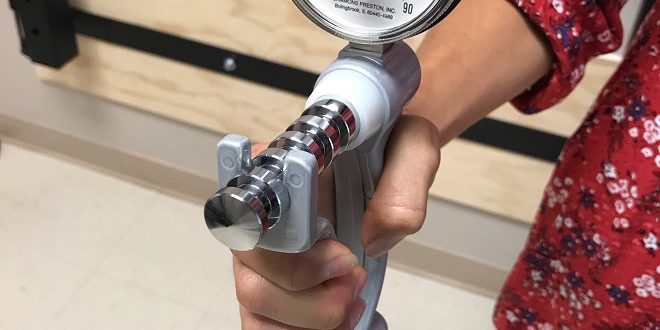By Heather Hausenblas, PhD
Not only is your ability to grab, hold, twist, pinch, and squeeze needed for many everyday tasks – it may also indicate how healthy you are and how long you will live. That’s the message from a study published in The Lancet that followed almost 140,000 adults from 17 different countries.
In this study, grip strength was measured using a hand dynamometer—an inexpensive, easy, noninvasive instrument that measures the maximum force that a person can squeeze two handles together. The researchers found that those with the greatest grip strength, an indicator of muscle health in the hands and forearms, were more likely to live longer. Researchers also showed they were less likely to die from a heart attack or stroke over the course of the four-year study. Additionally, grip strength was more accurate than blood pressure in forecasting fatal heart disease.
Signaling Future Health Issues
Another recent review of over three million people confirmed that grip strength is an independent predictor of all-cause mortality and cardiovascular diseases. A growing body of research is finding that grip strength is related to other health outcomes such as depression, health-related quality of life, hip fractures, cancer, and even brain health. In short, maintaining muscle strength throughout life, and especially in later life, is important for longevity, overall health, and aging independently.
Could grip strength become our next vital sign?
A weak grip may also signal a higher risk of future health problems such as diabetes and heart disease in children, according to research published in the Journal of Pediatrics. The researchers examined grip strength and health among youth and then re-evaluated their grip strength two years later. They found that girls and boys with weak grips were over three times more likely to either remain in poor health or to have a decline in health than those with strong grips.
 We know that grip strength grows weaker as we age, which eventually begins to affect our day-to-day activities, like opening jars, lifting pots, carrying groceries, pulling weeds, turning door handles, holding a toothbrush, and picking up a baby. How can you take steps to improve your grip strength and possibly avoid health problems down the road?
We know that grip strength grows weaker as we age, which eventually begins to affect our day-to-day activities, like opening jars, lifting pots, carrying groceries, pulling weeds, turning door handles, holding a toothbrush, and picking up a baby. How can you take steps to improve your grip strength and possibly avoid health problems down the road?
You can go to a gym and use equipment such as barbells, dumbbells, and kettlebells. If you prefer not to frequent the gym, you can do exercises at home like pull-ups and push-ups. If you do not care to commit to an exercise routine, you can squeeze a stress ball, crumple newspaper, or wring out a wet cloth. You can also try natural supplements and vitamins, such as fenugreek and vitamin D, that have been shown to increase grip strength.
It’s time to get a grip on your health.

Fit Life, by fitness and healthy aging expert Heather Hausenblas, Associate Dean of the School of Applied Health Sciences and Professor of Kinesiology in Jacksonville University’s Brooks Rehabilitation College of Healthcare Sciences, is a recurring column in The Florida Times-Union. E-mail your questions to hhausen@ju.edu.
 Wave Magazine Online Jacksonville University News Hub
Wave Magazine Online Jacksonville University News Hub
